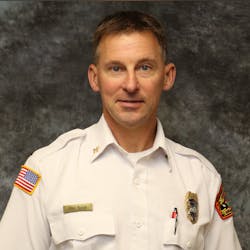The Importance of English Skills for Fire Service Members
Emojis and short, incomplete sentences that lack punctuation are diminishing the professionalism of the written word in the fire service. These types of communication might be OK for short news blasts or public safety messages. They are not OK for professional communications, such as incident reports, performance reviews, incident action plans and grant requests.
Now is the time for everyone who reads this article to place a higher emphasis on better grammar and communication skills.
Gen Ed requirement
Most generally, college degrees require English composition, mainly because the course supplies the basic writing skills and grammatical knowledge for writing that’s necessary in other classes. Particular to the fire service, English skills are a foundation that all members must grasp to become confident writers, so our written words reflect professionalism. Beyond that, our written words also translate into our spoken words. A vaster vocabulary allows us to communicate at varying levels, so we can connect very clearly and basically with people who are distraught and in crisis or, more formally, while working through an important project with upper-level supervisors.
The firefighter
There is no doubt that skill and ability is mission critical for firefighters. The community relies on firefighters to arrive at emergencies and perform at the absolute best of their abilities.
Firefighters must understand that a large part of the emergency response entails communication. From interpreting pre-incident plans to obtaining a medical history from a victim, firefighters must be able to relate their findings to other responders in a way that’s understandable.
At the medical emergency, firefighters must build a rapport quickly with the patient, so the delivery of emergency care occurs in a timely manner. Having a good grasp of sentence construction allows firefighters to relate information to the patient sensibly and with as little potential for confusion as possible—perhaps most importantly in the case of a young patient, an older adult or someone who has special needs. The give and take that results paves the way for the firefighter to arrive at an assessment to create a course of action.
Firefighters might have the best medical skills on scene, but if they can’t communicate their actions to the patient, they might meet resistance to providing the treatment that’s needed.
The officer
As firefighters promote to officer positions, high-quality oral and written communication skills become even more important.
Officers’ incident reports can become discoverable documents: The incident report that’s written today can turn into evidence in a court case years down the road. Early in my career as an officer, I learned this lesson the hard way: I had to recall critical incident information from memory, because a poorly written incident report lacked crucial details. That situation was uncomfortable to me personally and, worse, reflected poorly on my organization. This lesson positively affected all future writing and incident reports.
Also, officers’ role as a crew leader requires them to be able to communicate their expectations in a way that’s understandable. When officers encounter someone who doesn’t follow directions, they must ask themselves: Did the crew member understand the directions? Was the individual unable to perform the task or was that person unwilling? All three situations require a different approach. Crew members aren’t created equally and have varying levels of understanding. Officers might need to alter how they deliver directions, so all members understand the intent of those directions. If crew members are unable to perform tasks, it’s officers’ responsibility to teach and train. If a member is unwilling, officers must provide clear documentation of their actions.
Administration
The role of fire service administration is to support operations. That support comes in the form of funding, policy development and presenting fire service needs to other professionals.
Administrators’ daily interactions with other professionals include phone calls, virtual and in-person meetings and written communications, such as email, budget requests and other administrative business.
Poor grammar skills and English errors have the potential to undermine the administrator’s intent and to interfere in the communication process. Interference creates delays and can lead to missed opportunities.
Always Room to Improve English Skills
Strong English skills are critical for fire service members. Here are a few ways to make improvements.
• Practice reading, writing, listening and speaking skills at your level.
• Commit to reading one book per month and begin by choosing a topic that interests you.
• Write a proposal and have someone who has good grammar skills proofread your work.
• Listen to speakers and make notes of what makes a good communicator.
• Teach something to the members of your station and ask for an honest evaluation of your communication skills.
• Consider taking an English, writing or communications class.
About the Author

Mike Novak
Mike Novak is the division chief of training and safety for Branson, MO, Fire Rescue. His areas of responsibility with Branson include training program management as well as health and incident safety. Novak serves as the Region 7 Volunteer Advocate Manager for the National Fallen Firefighters Foundation’s Everyone Goes Home program, an adjunct instructor for the University of Missouri's Fire Rescue Training Institute, and a regional sales and training associate with Pleiadian Systems. He holds a master’s degree in public administration in emergency services administration and is credentialed as a Chief Fire Officer through the Center for Public Safety Excellence and as an Executive Fire Officer through the National Fire Academy. He presented on VR training at the inaugural FireFusion conference in November 2024.
